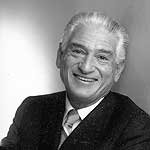Sep 11
2013
A Vision to the Cure for America’s Healthcare System

Guest post by Joseph H. Kanter, founder of the Kanter Family Foundation.
“If I ran my business the way our healthcare system operates, I’d go bankrupt,” is all I could think almost two decades ago, as I struggled with a life-or-death decision – which course of treatment to pursue for my prostate cancer.
As a self-made businessman whose key to entrepreneurial success stemmed from informing every business decision I made with objective data, I simply could not believe that none of my doctors could answer a seemingly simple question I posed. “Based on the experiences of other patients like me,” I asked, “which treatment is likely to work best?” Every doctor I saw was only able to answer with, “In my experiences…”
Data did not exist to offer me the information I desired to inform my decision.
My frustrating patient experience led me to envision what some experts now believe is the key to the cure. I imagined a health system in which every patient’s health experiences would be captured digitally and in which we would learn from millions of people’s lifetimes of health experiences (while safeguarding privacy).
This vision for transforming healthcare grew into what is today referred to as a Learning Health System (LHS). An LHS would enable massive amounts of digitized health data to be securely shared so researchers and other stakeholders could learn from it, and rapidly share it to, among other things, empower clinicians and patients like me with scientific information about what works best for every disease for every patient.
Those in the health IT industry should integrate aspects of the LHS vision into their strategic thinking. To generate the greatest impact electronic health records (EHR) should not be ends, but should be considered as means to capturing and securely sharing data to empower all healthcare stakeholders to make more informed decisions.
A decade ago, recognizing the potential to learn from real-world health experiences captured in EHRs and other data sources, a team led by Dr. Richard Tannen of the University of Pennsylvania initiated a rigorous investigation to explore this topic. The team’s work leveraging a large database in the UK demonstrated that lessons could be learned from real-world data and that analytic techniques can surmount challenges including “unrecognized bias.” Dr. Tannen’s work also led to a recognition that data from 50 million or more patients’ health experiences may be needed to realize maximum impact.
Today, our nation’s healthcare system is going digital, due in part to $30 billion in federal funds allocated for health IT in HITECH Act portions of the American Recovery and Reinvestment Act of 2009 (ARRA), expected to stimulate more than $150 billion in private spending in this arena. With such an historic investment, we simply cannot afford not to harmonize efforts to capture and exchange data into a health system that enables the type of rapid learning envisioned by myself and others. Indeed, the LHS imperative is supported by a series of reports by the IOM, the Federal Health IT Strategic Plan: 2011-2015, an entire issue of Health Affairs dedicated to rapid learning, and a recent New England Journal of Medicine commentary.
Every one of us has been or will be a patient, yet the vast majority of us will take lessons that could be learned from our health experiences to our graves with us when we die; nobody else will benefit from what we went through, and we will not benefit from what others have been through. Our failure to do so today in part results in a healthcare system that wastes $750 billion per year, kills 98,000 people per year because of medical mistakes in hospitals alone, takes 17+ years to translate new knowledge into practice, and prescribes drugs that do not work as intended as often as half the time.
For the past decade and a half, the philanthropic foundation I founded has built momentum to change that. Last year, the Joseph H. Kanter Family Foundation funded an historic LHS Summit at The National Press Club in Washington, D.C., bringing together key stakeholders across the healthcare spectrum to build consensus on Core Values that will underpin a national-scale LHS. More than 50 leading organizations in healthcare have formally endorsed the Core Values, and hundreds of individuals are working collaboratively in what is growing into a multi-stakeholder national grassroots movement to transform healthcare and health.
I want to spark a national dialogue, from people’s living rooms to doctors’ offices to the halls of Congress and to the business community. Right now, our healthcare system is ailing and diseased, but a major solution awaits with the advent of a national-scale (and one day global) LHS. Such a system, if developed properly, will transform our lives.